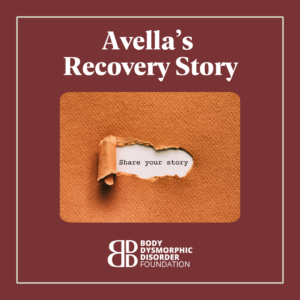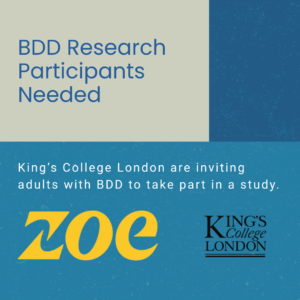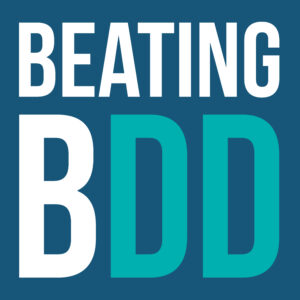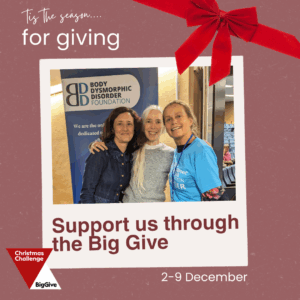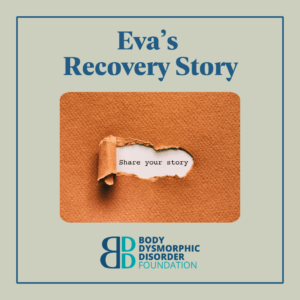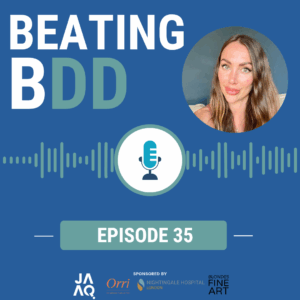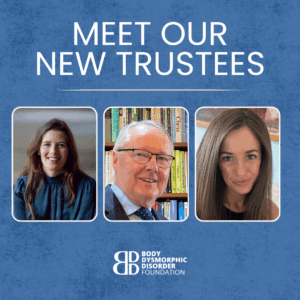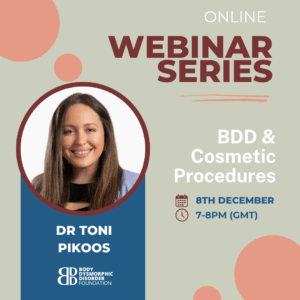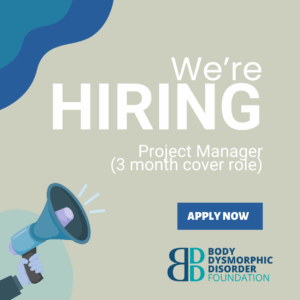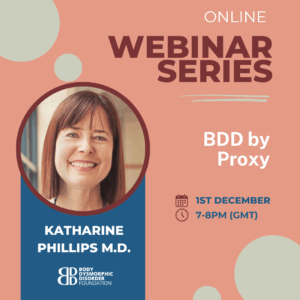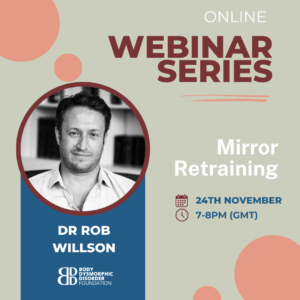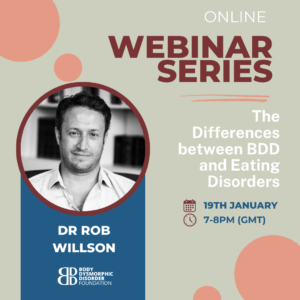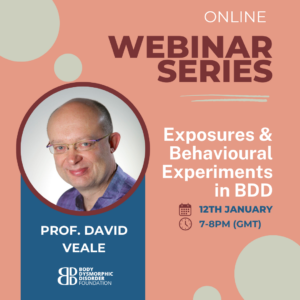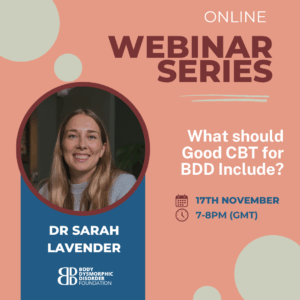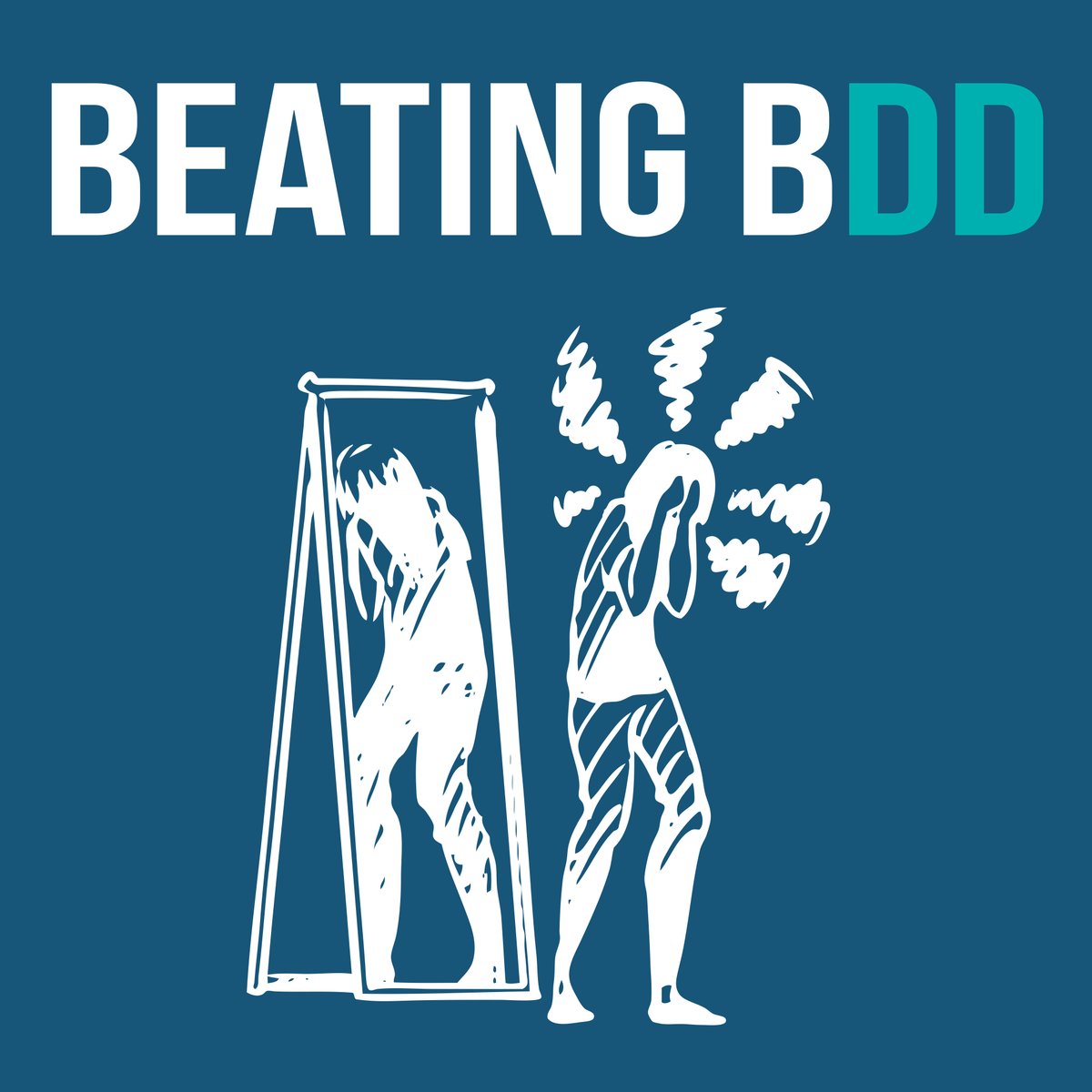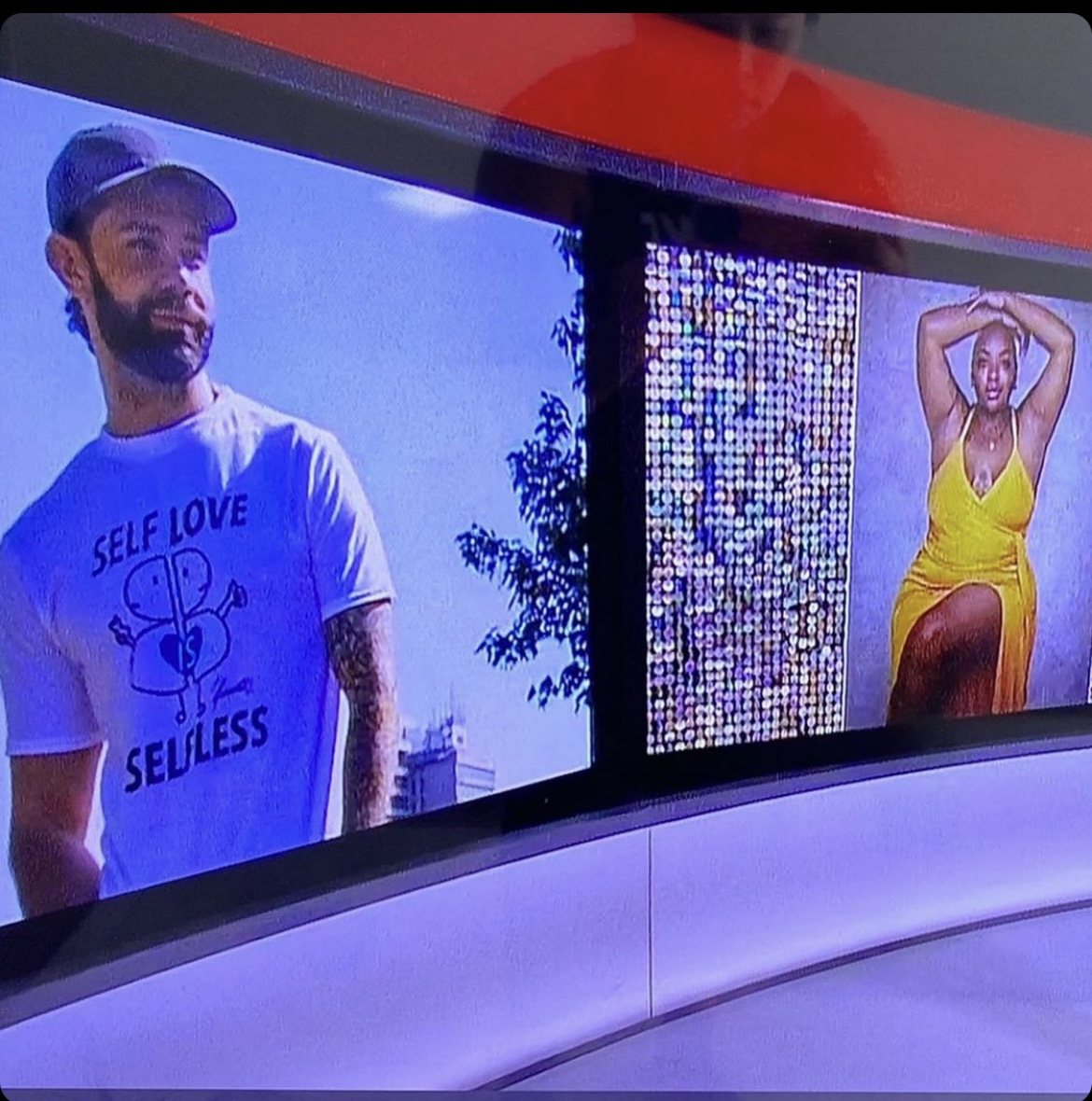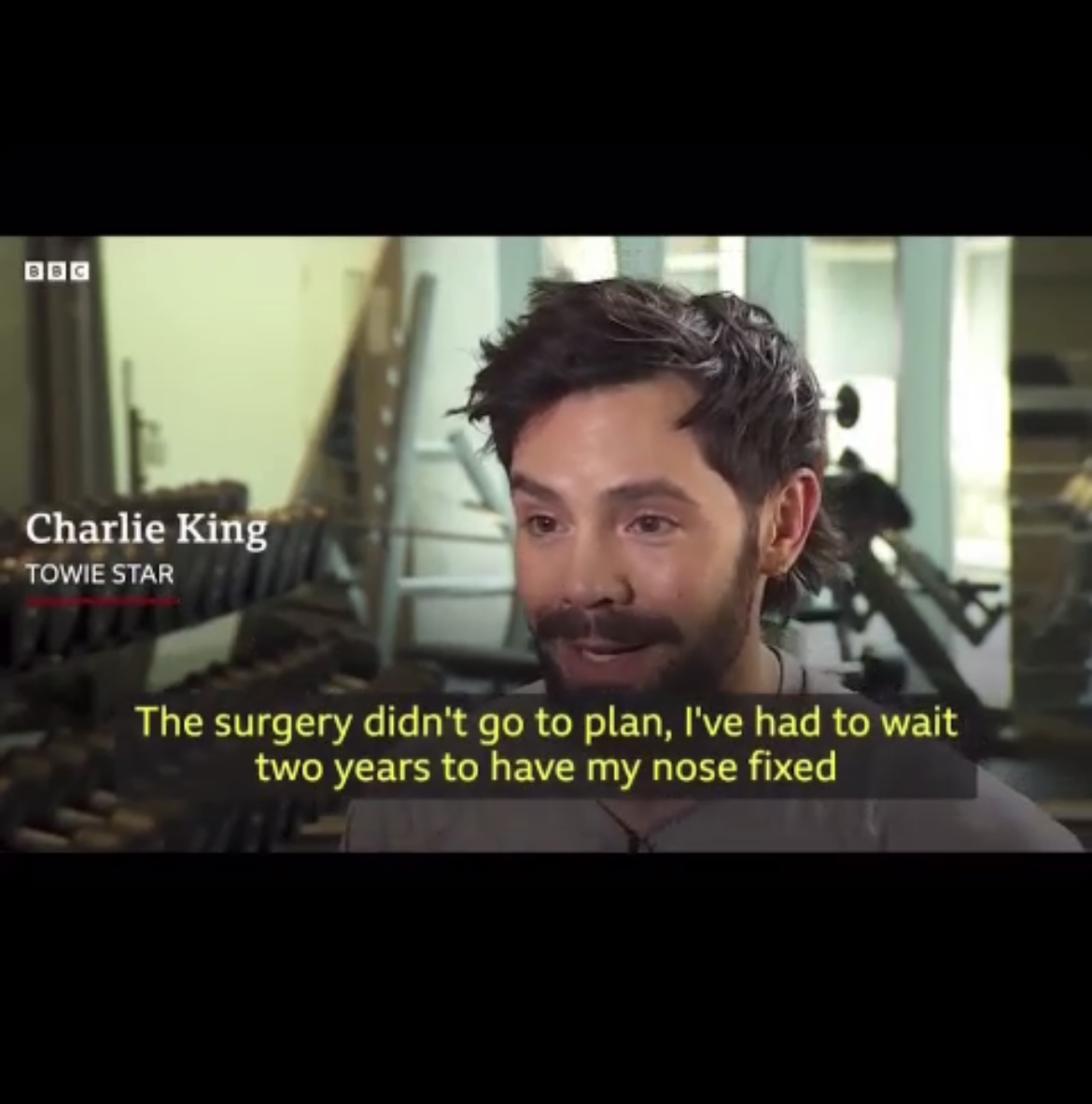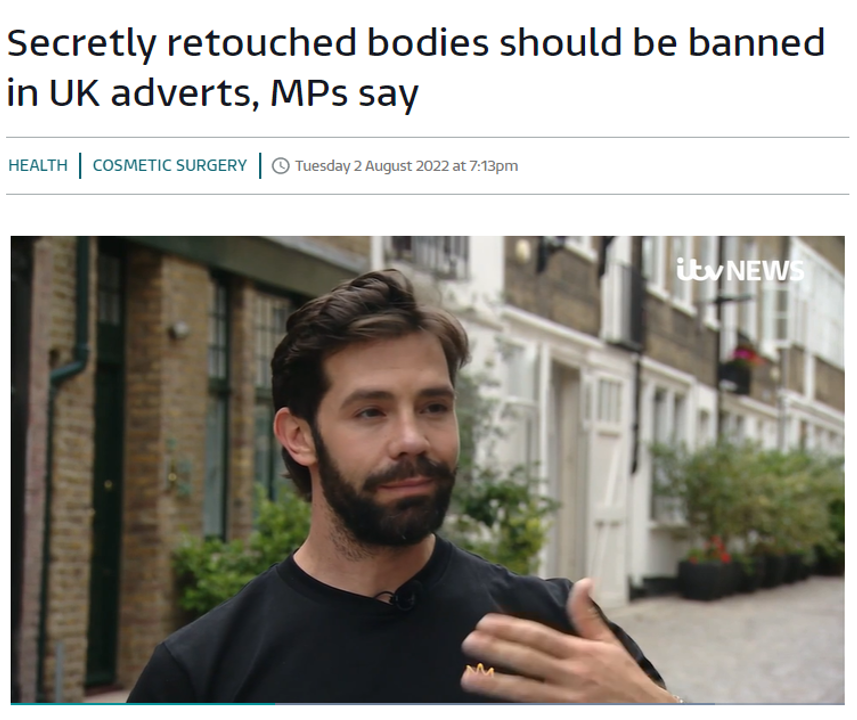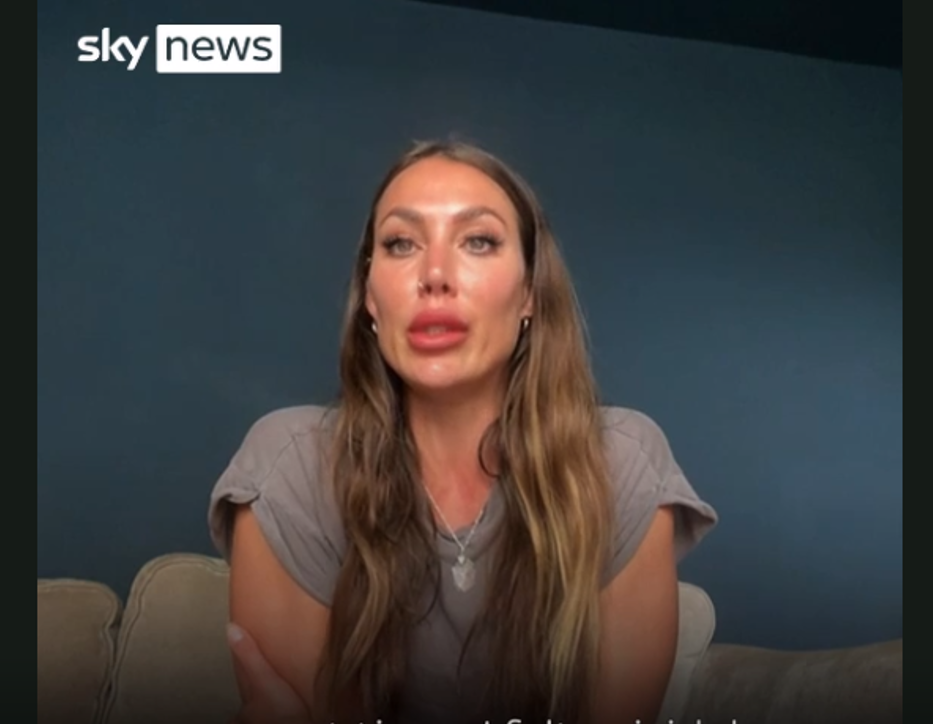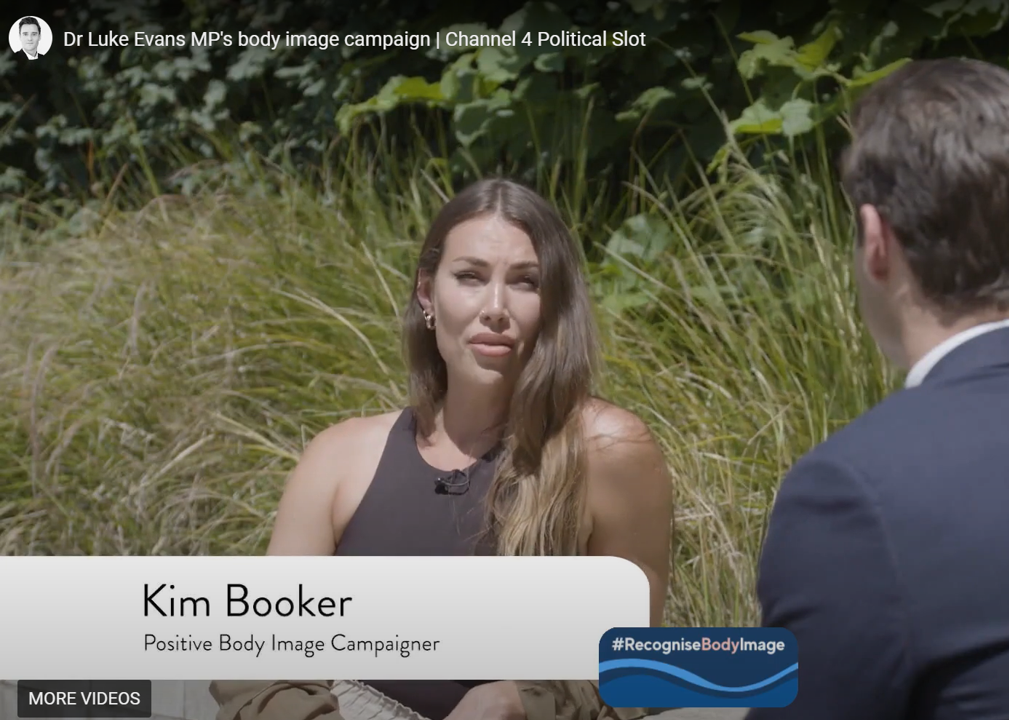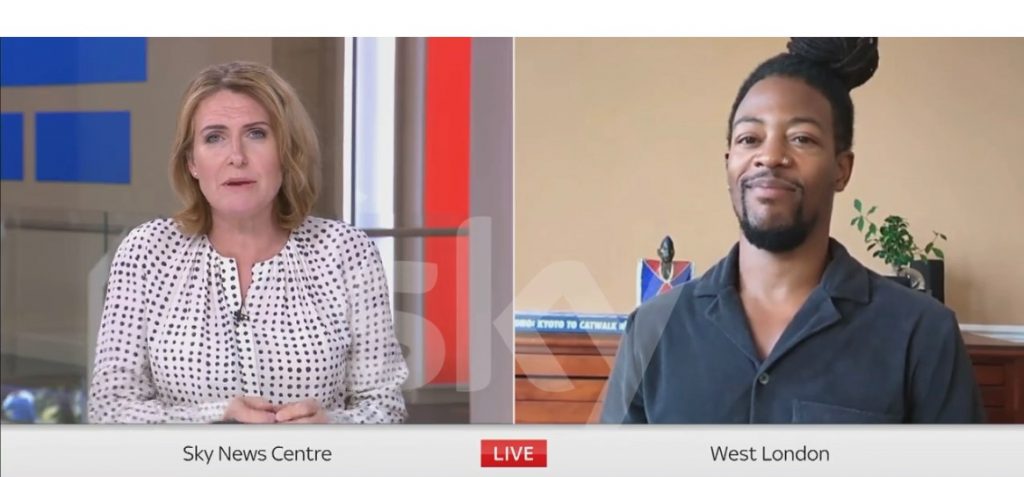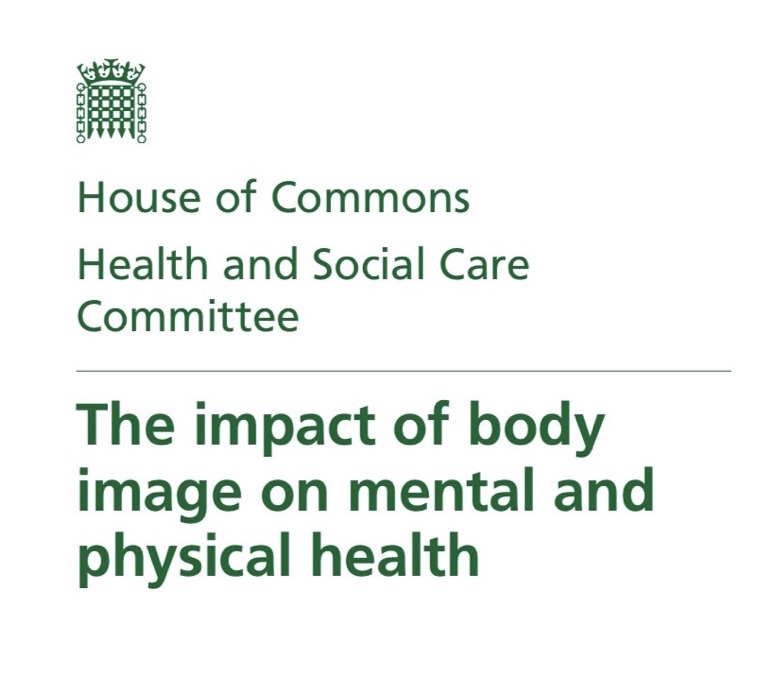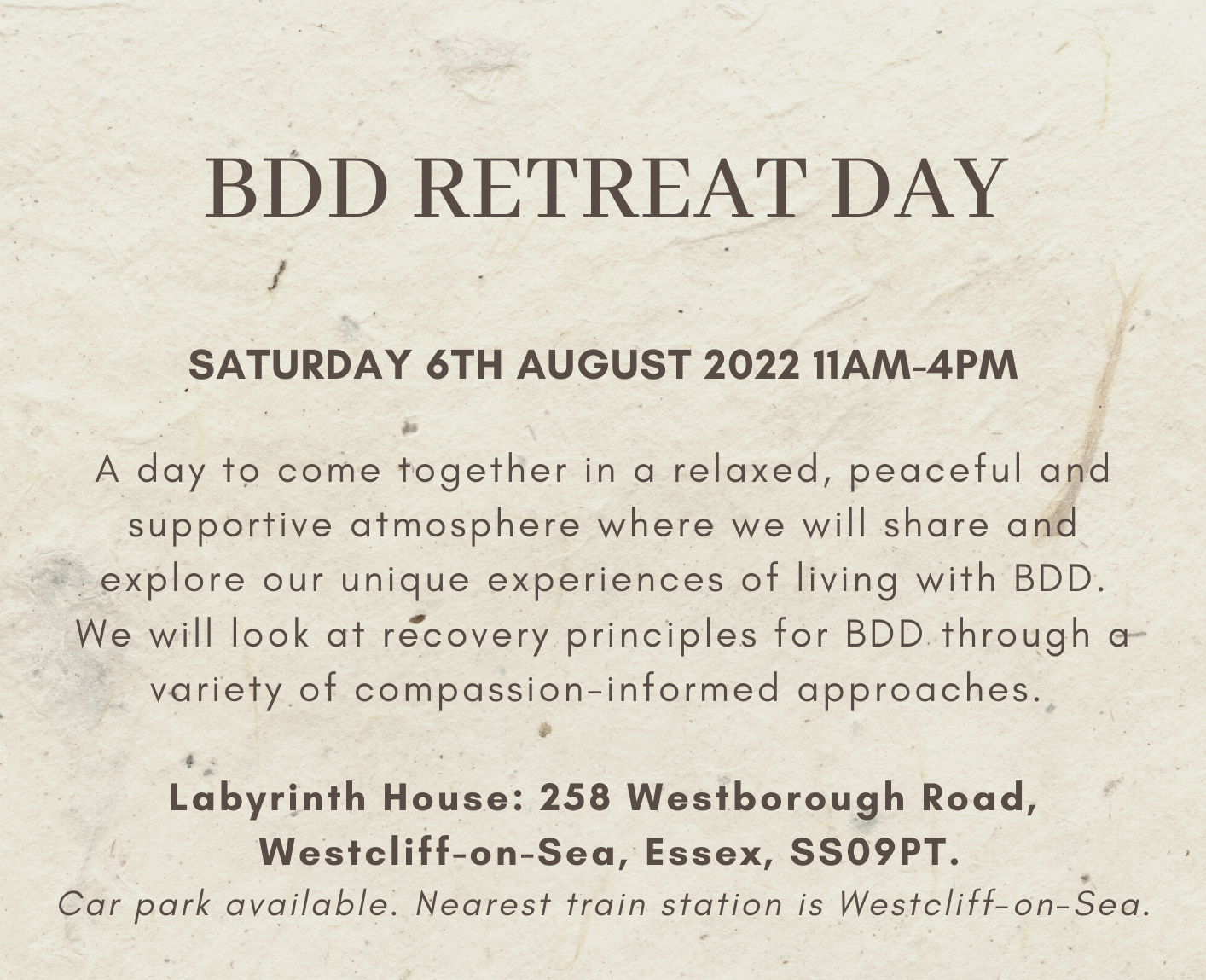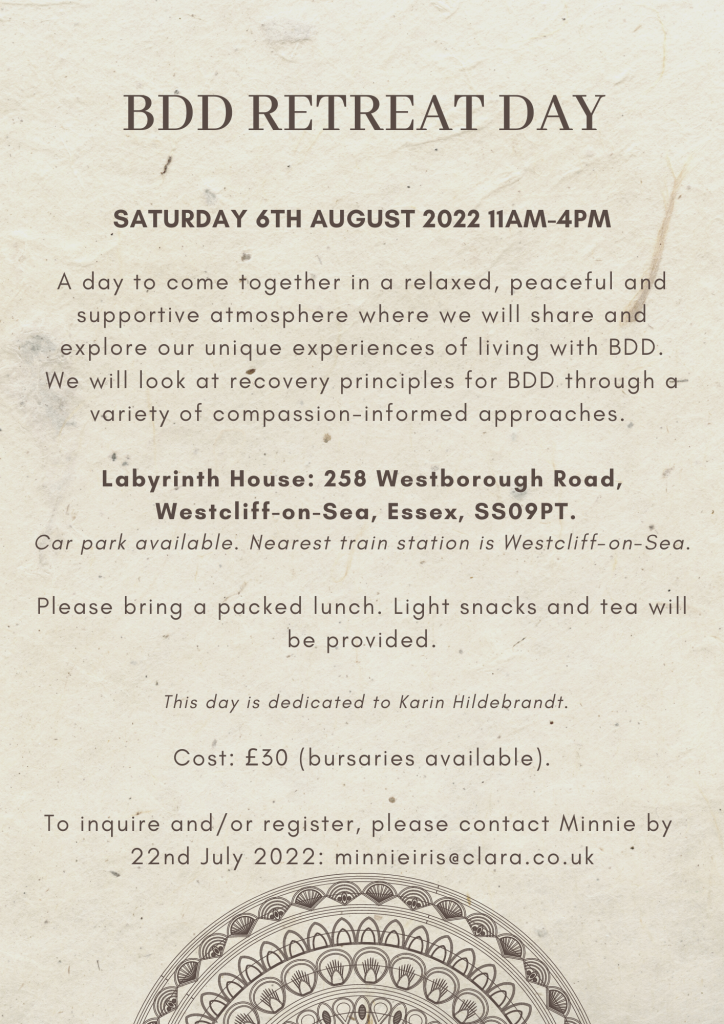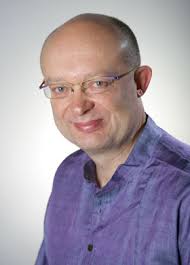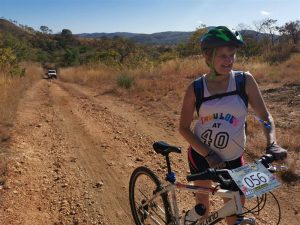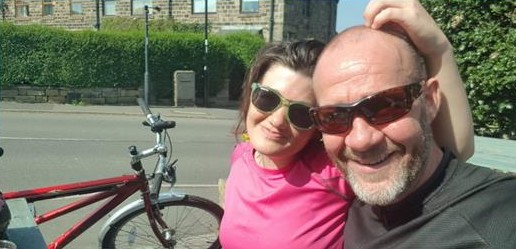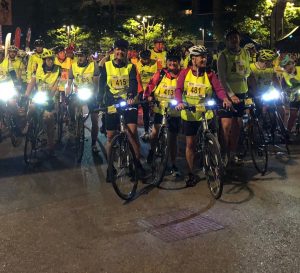This Autumn we are bringing you a new series of webinars covering new topics that we hope will be of interest and support to the BDD community.
Register your attendance for the following live zoom webinars:

Robyn Stern will be presenting a webinar on:
‘Managing Social Media and BDD’
Navigating social media in an appearance focused world, having BDD.
Date: Wednesday 12th October
Time: 7-8pm GMT
Robyn is a licensed clinical social worker in the United States specializing in treating BDD. Robyn is a member of the BDD Special Interest Group for the IOCDF and conference planning committee for BDD for IOCDF. She was formally diagnosed with BDD when she was 22 years old after several years of not knowing what was wrong with her, misdiagnosed with depression and anxiety and struggling to maintain day to day tasks and functioning.
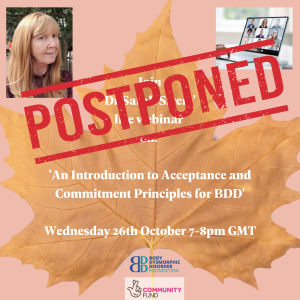
Dr Sarah Sivers will be presenting a webinar on:
‘An Introduction to Acceptance and Commitment Principles for BDD’
This webinar introduces the six core principles of Acceptance and Commitment Therapy (ACT) and the concept of Psychological Flexibility. It is an opportunity to engage in activities to bring these principles to life and potentially discover a different way to approach interacting with BDD. ACT is a beautifully adaptable approach and it is hoped that some or all of the ideas will resonate and offer additional resources for managing day-to-day life with BDD.
Date: Wednesday 26th October Unfortunately we are having to postpone this webinar until January due to unforeseen circumstances.
Time: 7-8pm GMT
Sarah is a Child, Community and Educational Psychologist and a Chartered member of the British Psychological Society. She has been developing her skills using Acceptance and Commitment Therapy (ACT), both personally and professionally, for a number of years. In recent months she has welcomed the opportunity to connect with an online BDD group and an in-person retreat day to share ACT principles and think with others about how these ideas might support their lived experience of BDD.
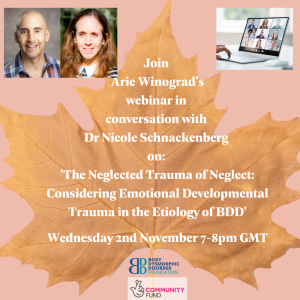
Arie Winograd alongside Dr Nicole Schnackenberg be presenting a webinar on:
‘The Neglected Trauma of Neglect: Considering Emotional Developmental Trauma in the Etiology of BDD’
Emotional developmental trauma is often neglected when treating clients with body dysmorphic disorder. Unlike tangible traumas, emotional developmental trauma is about what did not occur rather than what did occur. Most BDD sufferers have experienced at least some degree of emotional developmental trauma, and many are not even aware that something was missing in the first place. It is essential to work through this neglected trauma in order to achieve the best prognosis for long term recovery from body dysmorphic disorder.
Date: Wednesday 2nd November
Time: 7-8pm GMT
Arie is the founder and director of the Los Angeles BDD & Body Image Clinic. He has dedicated his entire career to the treatment of body dysmorphic disorder. In 1998 he initiated the first body dysmorphic disorder studies at the University of California, Los Angeles. These seminal studies were only the beginning of his many years of working extensively with individuals with BDD. As author of the book Face to Face with Body Dysmorphic Disorder: Psychotherapy and Clinical Insights, he regularly lectures nationally and internationally on the subject. His formal psychotherapy background includes graduate studies completed at Pepperdine University as well as six years of clinical experience at the UCLA Obsessive Compulsive Disorder Intensive Treatment Program.
Dr Nicole Schnackenberg is a Child, Community and Educational Psychologist, a psychotherapist, a 200-hour Hatha yoga teacher and a certified Kundalini yoga teacher with extensive training in yoga therapy. She currently divides her time between her role as a psychologist at Southend Educational Psychology Service, her position as a trustee of the Body Dysmorphic Disorder Foundation and of the Give Back Yoga Foundation UK, and her facilitation of the Eat Breathe Thrive yoga programme for food and body image issues. In addition to her contribution to projects at the Minded Institute, she also works with the Special Yoga Foundation in London and is a director of the Yoga in Healthcare Alliance.

Dr Amita Jassi and Dr Elif Gocken will be presenting a webinar on:
‘Autism Spectrum Disorder (ASD) with BDD’
This webinar will explore how BDD presents in autistic people and discuss ideas for how cognitive behaviour therapy can be adapted for this group to optimise treatment outcomes. There will be a Q&As slot and an opportunity for discussion.
Date: Wednesday 9nd November
Time: 7-8pm GMT
Amita is a Consultant Clinical Psychologist and lead for the National Specialist BDD service for young people at South London and Maudsley NHS Trust. She has worked with young people with BDD, OCD and related disorders since 2006. She has authored several books on OCD and BDD and published peer-reviewed papers in this field. Amita is also a valued and actively engaged trustee of the BDD Foundation.
Elif is a clinical psychologist working at National Specialist BDD service for young people at South London and Maudsley NHS Trust. She has experience in teaching on Doctoral Clinical Psychology and CYP IAPT courses as well as training NHS professionals in identifying and working with mental health difficulties. She has a particular interest in autism research in clinical and subclinical groups and has approximately 10 years of research experience in this area. She is a trustee for Autism Forward which is a charity supporting funding for specialist employment mentoring for individuals with autism.

Scott Granet, Chris Trondsen & Robyn Stern will be presenting a webinar on:
‘BDD and Relationships’
BDD and relationships, yes you can have them. Navigating relationships with BDD.
Date: Wednesday 16th November
Time: 7-8pm GMT
Scott has been practicing adolescent and adult psychotherapy for over 35 years since receiving his Masters degree at New York University. He is known for his commitment to increasing professional and public awareness of OCD and body dysmorphic disorder. Author of Body Dysmorphic Disorder, Mine and Yours: A Personal and Clinical Perspective. He has also written various articles, presented at numerous U.S. and international conferences, and has appeared on national and local television and radio shows. He is a clinical social worker in private practice and in June 2008 opened the OCD-BDD Clinic of Northern California in Redwood City.
Chris is on the board of directors at the International OCD Foundation (IOCDF). Chris is also the vice president of OCD Southern California and is a leader of the IOCDF’s BDD and LGBTQ+ Special Interest Groups. Chris’s passions include expanding BDD awareness and education and addressing LGBTQ+ issues in mental health treatment.
Robyn is a licensed clinical social worker in the United States specialising in treating BDD. Robyn is a member of the BDD Special Interest Group for the IOCDF and conference planning committee for BDD for IOCDF. She was formally diagnosed with BDD when she was 22 years old after several years of not knowing what was wrong with her, misdiagnosed with depression and anxiety and struggling to maintain day to day tasks and functioning.
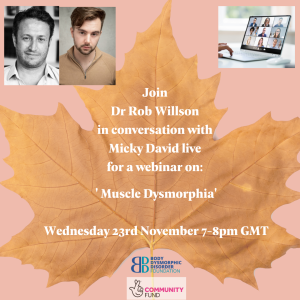
Dr Rob Willson & Micky David will be presenting a webinar on:
‘Muscle Dysmorphia’
Sadly, George Mycock who was scheduled to take this webinar had to pull out.
We now have leading expert, Dr Rob Willson who will present on Muscle Dysmorphia in conversation with Micky David who has lived experience.
Date: Wednesday 23rd November
Time: 7-8pm GMT
Dr Rob Willson PhD is a cognitive behaviour therapist based in North London, with a special interest in OCD, BDD and Health Anxiety. He co-authored with David Veale and Alex Clarke the self-help book Overcoming Body Image Problems including BDD. He first became involved in research on BDD 20 years ago. Currently, he divides his time between private practice and conducting research on improving the understanding and treatment of BDD. He is currently the chair Body Dysmorphic Disorder (BDD) Foundation, the world’s first charity exclusively devoted to BDD. Prior to building his own practice, Rob spent twelve years working at the Priory Hospital North London where he was a therapist and therapy services manager.
Micky is an actor and writer. His current project Bulking Up is a short film that follows the character of Danny as he embarks on a rigorous twelve week bulking regime in the hope of finally making peace with his own reflection. The film aims to raise awareness of muscle dysmorphia in men and the catastrophic consequences the disorder can have on men’s lives. The film is partly based on Micky’s own experiences and is set to shoot in early 2023. Micky’s most recent project was playing one of the leads in Battle Over Britain, a feature film about a squadron of spitfire pilots during the Battle of Britain. The film is due to be released late 2023.

Professor David Veale will be presenting a webinar on:
‘Olfactory Reference Syndrome (ORD)’
This webinar will give an overview of ORD, which consists of a preoccupation with a perceived foul or offensive body odour or breath (halitosis). The perceived body odour is either unnoticeable to others or appears very slight to an observer, so that the concerns are completely disproportionate to the smell, if any. An individual with olfactory reference disorder typically tries to check how he or she smells by repeatedly checking his or her body, changing clothes, seeking reassurance; attempts to camouflage the perceived odour by using perfume or deodorant, or prevent it by frequently bathing or brushing teeth, or by changing clothes, or by dieting or unusual food intake; or avoids situations or activities that are anxiety-provoking (e.g., being close to an another person). It is very distressing and can be very interfering in one’s life. ORD is uncommon but has a lot of overlap with the problems in Body Dysmorphic Disorder. Not a lot is known about the optimum treatment of ORD, but it is likely to be similar to BDD and OCD, namely Cognitive Behaviour Therapy that is specific for ORD and SSRI medication.
Date: Wednesday 30th November
Time: 7-8pm GMT
David is a Consultant Psychiatrist in Cognitive Behaviour Therapy at the South London and Maudsley NHS Trust and Nightingale Hospital London in Marylebone. He is a Visiting Professor at the Department of Psychology, King’s College London. He specialises in obsessive compulsive disorder (OCD), body dysmorphic disorder (BDD), health anxiety and a specific phobia of vomiting (emetophobia). I am also interested in the rapid treatment of depression using Wake and Light Therapy and nutritional psychiatry. He is also a long standing trustee of the BDD Foundation.
More stories from the community
